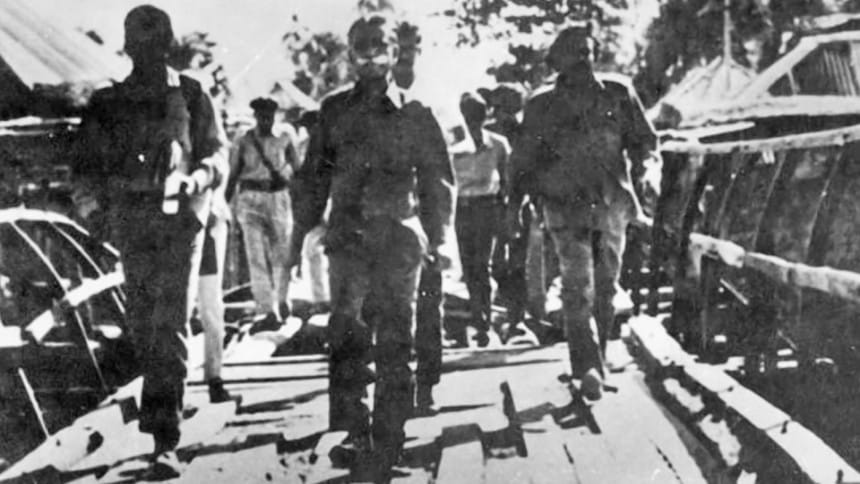The man who inspired us during war

It was April 4, 1971, a little over a week after we had revolted against the Pakistan Army and the Pakistan government. I was then a member of the Second Battalion of the East Bengal Regiment, commonly known as Second Bengal. Being a second lieutenant and the junior most officer of the battalion, as tradition required, I was always with the Commanding Officer, and therefore had the opportunity to witness this historic moment. Colonel Mohammad Ataul Ghani Osmani was presiding over a meeting of senior Bengali officers who had by then revolted.
The meeting was organised quite hastily and secretly, in the bungalow of the manager of the Teliapara Tea Garden in Habiganj district, near the border with India. Among the prominent attendees were Major Ziaur Rahman, Major K M Shafiullah, Major Khaled Mosharraf, Major Shafayat Jamil, and Major Kazi Nuruzzaman. The objective of the meeting was to coordinate the operations of the Second, Fourth and Eighth Battalions of the East Bengal Regiment which had joined the war of liberation.
Colonel Osmani, who was short in stature, was known for his grey, luxuriant moustache. To my surprise, I found his hair and moustache to be shaved off completely. It was apparently to hide his identity while crossing the eastern border from Bangladesh into India.
In the tumultuous early weeks of our liberation war, he was the symbol of unity for the rebel officers and soldiers of the East Bengal Regiment—nay, the ever-growing group of freedom fighters. Colonel Osmani was too senior to me to have any personal acquaintance with. As an aide to my commanding officer, Major K M Shafiullah, I was around the meeting table with maps, a lantern and a broken twig to be used as a pointer. Colonel Osmani, as he was then, left the tea garden soon after the meeting.
Later we realised that the first chapter of a glorious history had just been written. Osmani appeared bold and decisive in the meeting. His English accent was similar to that of the British. During the nine-month war, we often received mails from the Headquarters of Bangladesh Forces (HQ BDF) located in Kolkata. My seniors testified that much of the plans, orders and their expressions were Osmani's own.
After the victorious end of the war, Osmani continued to be the Commander-in-Chief of the Bangladesh Forces. Bangladesh Army, Bangladesh Navy, and Bangladesh Air Force were being organised as separate entities. Osmani relinquished his military post and responsibility in the first week of April 1972, and the respective Chief of Staff assumed responsibility for the newly organised Bangladesh Navy and Bangladesh Air Force and the reorganised Bangladesh Army. Osmani was given the rank of a four-star General effective from the day of the victory.
His dedication to youth development and leadership was exceptional. Before joining the army, I was a student of the famous The East Pakistan Cadet College, which in 1964 became Faujdarhat Cadet College. By 1971, there were four cadet colleges in East Pakistan. These were modelled after and run more or less like British public schools, focusing on preparing the youth for leadership in various sectors of the country, by imparting an all-round education. The colleges had large grounds and well-constructed academic and residential buildings.
In independent Bangladesh, early in 1972, the then government announced its decision to close down the four cadet colleges, including Faujdarhat Cadet College, and convert these into normal schools and colleges. The old cadets of Faujdarhat played a pioneering role in the "Save Cadet College Campaign." It was also joined by the well-wishers of the cadet college system. Their movement to keep the cadet colleges open and functional would not have succeeded if Osmani had not taken sides with the boys. It is he who pleaded with Bangabandhu to allow the colleges to function. Ultimately, Bangabandhu decided in favour of retaining the system.
In early April 1972, Osmani was made a minister in the cabinet with Bangabandhu as President. But he continued to assist Bangabandhu in matters related to the war of liberation. The committee that finally decided on matters to the gallantry awards was headed by him.
Today, as we observe his 99th birth anniversary, I feel Osmani remains a largely unsung hero. I have come across a number of his biographies, mostly written in Bengali language and only one in English. I just hope today's generation will study and find inspiration from Osmani's rich and illustrious life and career.
Major General (Retd) Syed Muhammad Ibrahim Bir Protik is a Freedom Fighter and Chairman, Bangladesh Kallyan Party.





Comments